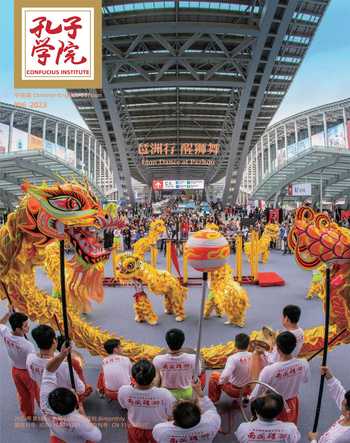“年例”: 比春节还热闹的节日
陈李茂




对生活在广东西部湛江、茂名地区的民众来说,年例是众多海岛上最热闹的节日。所谓“年例”,即“溯古例今、年年有例”,是每年定期(主要在新年期间)举办的大型祭祀活动。关于其来源,众说纷纭,有说是古代驱除瘟疫的一种产物,有说是本地的元宵节,有说与冼(Xiǎn)夫人(冼英,古代粤西的女民族英雄,在湛江、茂名、海南有广泛的影响力)有关。
For the locals living in the Zhanjiang and Maomingareas of western Guangdong, Nianli (literally: YearlyTradition) is the liveliest festival on this island. Thename of the tradition comes from the locals’ beliefthat one should “trace ancient customs and celebratetraditions every year”. It is a large-scale sacrificialceremony held regularly (mainly during the New Yearperiod). ere are various tales about its origin. Somesay that it can be traced back to ancient practices toward off diseases, while others say that it is a localversion of the Lantern Festival. In addition, somebelieve that it is related to Madam Xian (Xian Ying),a female hero in ancient western Guangdong whohad extensive influence in Zhanjiang, Maoming, andHainan.
在年例这天,海岛上的人们要“敬神”:家家户户都会准备好丰盛的贡品,有些摆放在寺庙,有些则集中放到一片开阔的空地上。贡品一般是煮熟的整鸡和整鹅等,下面还会垫放一挂熟五花肉;此外,还有本地特色的点心、苹果或橘子等寓意好的水果;再配上斟满的酒杯和茶杯。各家各户的贡品摆放在一起,琳琅满目。
On the day of Nianli, people on the islandspay homage to the gods: every householdprepares sumptuous offerings, some placed intemples, others displayed in openspaces. The offerings generallyinclude cooked whole chickens andgeese, accompanied by a rack ofcooked pork belly; moreover, thereare local specialty snacks, applesor oranges (symbols of well-beingand good fortune in China), andother auspicious fruits, along withfilled bowls of wine and tea cups.The offerings from each family aredisplayed together, presenting adazzling array.
除了“敬神”,還有“游神”。游神是指用专门定制的轿子抬着从庙里请来的本地神仙或祖公,按预先规划好的路线(一般是绕行本村)游行。游神队伍一路敲锣打鼓,所到之处,人们都会准备好贡品、线香、纸钱等并燃放炮竹。有些人家为了好兆头,会准备特别长、特别响的炮竹。
In addition to the presentation of offeringsto the gods, there is also “the parade of gods”.Statutes of the local deities or ancestral spiritsare carried according to a pre-planned route(usually around the village) on speciallycustomized sedan chairs. e procession clangsgongs and drums along the way, and whereverthey go, people take out offerings, incense,paper money, and set off firecrackers. Somefamilies even prepare particularly long and loud recrackers, wishing for good luck.
提及年例,还少不了“吃年例”。年例宴席的丰盛程度堪比婚宴,不同的是,来吃年例的宾客不需要给主人礼金,只需带一点水果或礼品,或者给主人家的小孩一个红包。海岛上的年例饭菜甚为丰富,海鲜大多是直接从海里捕捞上来的,有蟹、虾、鲍鱼、鱿鱼、墨鱼、生蚝等。海岛上的人喜欢保留食材原本的鲜味,通常都是用水煮好,然后蘸酱料食用。年例时,各家各户的宾客不一定是本家的亲戚,也可以是朋友、同学或朋友的朋友等,宾客越多,家里越热闹,面子上越光彩。
ere is also the indispensable practice of “EatingNianli”. The feast of Nianli is as extravagant as awedding banquet. However, unlike those who attend awedding banquet, guests who come to eat Nianli do notneed to give the host gi cash. Instead, only a little fruitor a present, or a hongbao (red envelope) to the host’schildren will do. The food at Nianli on the islands isabundant. Most of the seafood is freshly caught from thesea, including crab, shrimp, abalone, squid, cuttlefish,and oyster. People on the islands prefer the originalfreshness of the ingredients; therefore they usuallycook them in the simplest way: boil them in water andthen dip them in sauce before eating. During Nianli,gatherings are held not only for relatives, but also forfriends, classmates, or even friends of friends. e moreguests there are, the more lively the atmosphere is, andthe more honored the host is.
除了吃年例,还可以“睇年例”,即看年例。在年例这天,除了可以吃到丰盛的美食,还有节目可以看。有些海岛上还会有飘色表演——指将选出的村民的子女(一般是小孩)精心化装成历史人物的形象,并安置在特制的游车上,到街道或广场上巡游。这些精彩纷呈的活动,让海岛年例更为热闹、更加精彩。
In addition to Eating Nianli, one can also “WatchNianli”. On the day of Nianli, in addition to abundantdelicacies, there are also performances to watch.Some islands organize performances called piaose(literally: oating color): selected villagers’ descendants(generally young kids) are carefully dressed up ashistorical figures and placed on specially made cartsto parade through the streets or plazas. ese splendidactivities make Nianli on the islands even more livelyand spectacular.
海島上的民众除了长年日出而作、日落而归的海洋牧场劳作,还有年例这样热闹的节日,全岛同庆,其乐融融,令人向往。千百年来,在茫茫的大海上,众多海岛默默地矗立其间,岛上的人们以自己的方式生活着,也敞开胸怀,欢迎远方的客人。
Nianli gives the locals, who work from dawn to dusk all year round, a breakfrom their labor at the marine ranch. It gives the whole island the opportunity tocelebrate and enjoy themselves. For thousands of years, the inhabitants of theseseemingly lonely islands have found their own ways of living with a heart thatopens to everyone, always welcoming visitors from afar.

